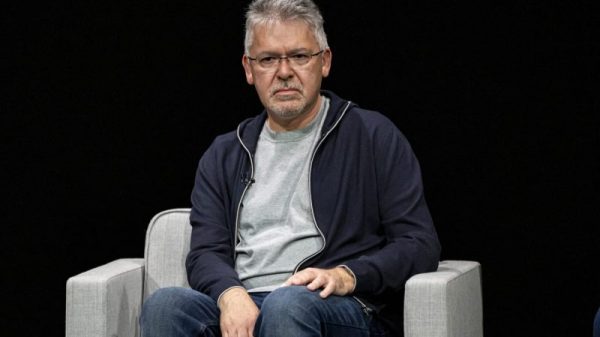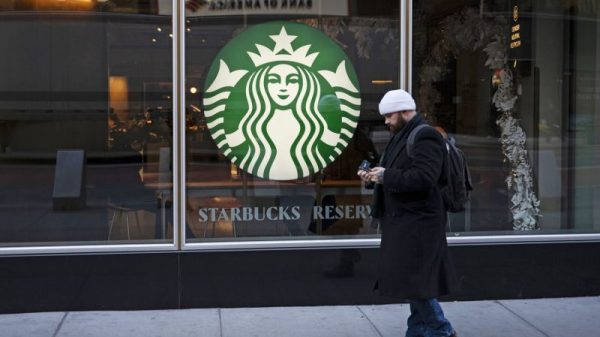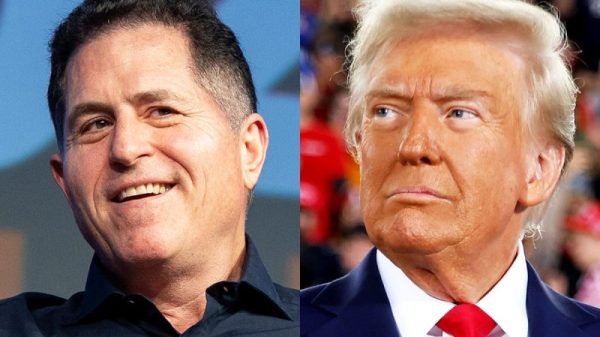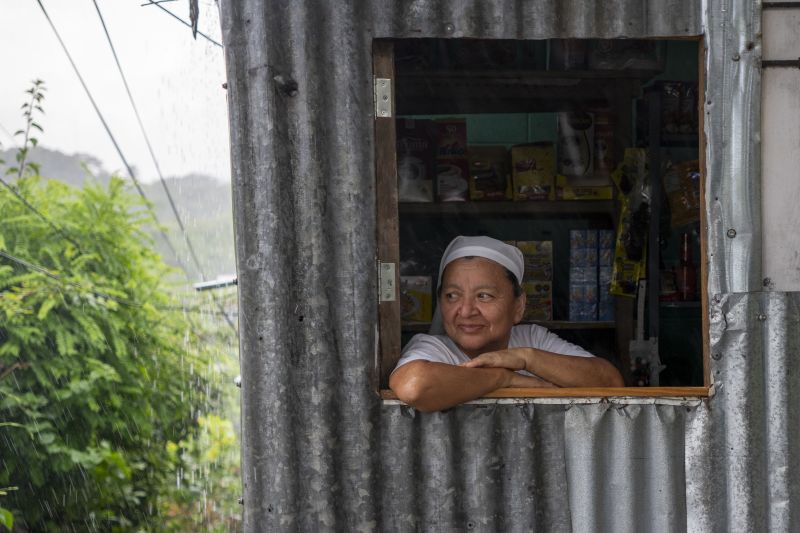For decades, life choices were bleak for many in El Salvador: Leave or die. Dubbed the “murder capital of the world,” there was an average of a homicide an hour in early 2016, in this country of just 6 million people — two million fewer than call New York City home. Gang warfare drove an exodus of Salvadorans, mostly north to the US. But now, the security situation is so different that people are returning, even after building good new lives over decades in the US.
Deported, and now grateful
When Victor Bolaños and his wife, Blanca, lost their asylum case in a US immigration court, their ‘American dream’ came crashing down. When they agreed to accept a voluntary departure order, the couple knew they had to leave behind the life they had been building for over 15 years in Denver and return to their native El Salvador and the conditions that had made them flee.
“We came back 6 years ago, and everything was unsafe,” Victor recalls, seated in the modest home the couple now shares in the capital, San Salvador. At 65, his voice carries the weight of what they faced upon their return in 2018. “When we came back the situation seemed difficult because of the insecurity, lots of robberies, lots of gangs.”
But a couple of years after their return, something unexpected happened. The relentless daily violence eased, and streets began to calm. The suffocating fear that had defined daily life started to fade.
El Salvador, once synonymous with violence and waves of emigration, saw a dramatic drop in crime. For many citizens, this shift offered more than just safety — it offered much needed hope. The world, too, took notice. Suddenly, the small Central American nation seemed to be reinventing itself under Bukele, who was elected President in 2019 at the age of 37. When his New Ideas party later took control of Congress, it was easier for rules to be bent or broken. Bukele won re-election, even though the country’s constitution had barred anyone standing for a second term. A “temporary” state of emergency granting authoritarian powers of detention is now more than two years old. Human Rights Watch says that even children are being caught up in “severe human rights violations.”
Yet in San Salvador, Blanca sits in her living room, carefully crafting handmade jewelry. “Now, one feels safe, freedom is felt in our country,” she says.
She and her husband, Victor, say the improved security has allowed them to start a small jewelry business from their home, something that once seemed impossible. “Now you can have a business, if you look, there are entrepreneurs everywhere in the country,” Blanca says, reflecting on how, not long ago, gang extortion would have crippled any such venture.
For decades, people from Central America, particularly from the Northern Triangle of El Salvador, Honduras and Guatemala, have fled violence and insecurity, seeking protection and opportunity in the US. But new data from US Customs and Border Protection (CBP) reveals a surprising trend — fewer Salvadorans are now heading north.
In 2022, CBP recorded more than 97,000 encounters with Salvadoran citizens at the Southern Border. By 2023, that number fell to just over 61,000, and 2024 is on track for an additional decline compared to 2023.
While these numbers may appear promising, the root causes of migration remain complex. Many Salvadorans still leave their country due to economic hardship and lack of opportunity. Although El Salvador’s economy has shown slow, steady growth since Bukele took office, according to the World Bank, the nation still struggles to provide sufficient opportunities for its citizens.
Leaving Houston to build a beach resort
For the past 27 years, Diego Morales has built a life far from home. The 48-year-old real estate investor, husband, and father of three left El Salvador in 1997, chasing the safety, stability, and opportunity that the US had to offer. The idea of returning had never crossed his mind — until the grim stories of violence that had haunted his homeland for so many years were replaced by tales of newfound safety.
Diego’s childhood was marred by a constant sense of danger. “I’d wake up, go to school and find dead people on the street,” he recalls, his voice bearing the burden of the painful memories as he sits inside his well-kept, suburban Houston home.
But today, El Salvador is no longer the country he fled. “Now it’s safe and many people are going back,” Diego says, his words a reflection of the optimism spreading among Salvadorans and others abroad.
The country’s reputation has dramatically shifted. Once known for violence, El Salvador is now attracting waves of investors. “Many people, even Americans … we have friends from Florida, from Austin, from Hawaii, looking to buy (property),” he says, a sign of just how far the nation has come.
Diego himself is preparing for a return to the land he once left behind. He has already invested in Tamanique, his hometown about an hour’s drive from the capital, where he built a beach resort that he now runs remotely.
Along the Salvadoran coastline, you can find beach towns like El Tunco, El Zonte, and La Libertad buzzing with new construction, capturing the attention of tourists and real estate developers eager to capitalize on the country’s rebirth. Cliffs that were once gang lookouts are now being considered scenic locations for hotels.
“As soon as President Bukele brought security to this country, everything went up (in value),” Diego says, adding that land that cost around $100,000 five years ago is now going for ten times that price.
And the Salvadoran dream is not just his — his 23-year-old son, Jairo, a natural-born US citizen also plans to follow in his father’s footsteps. “We’ve had conversations… it’s already starting,” Jairo says, his eyes lit with the promise of returning to his roots.
El Salvador’s government is courting those who left with a program of tax exemptions on belongings and vehicles for citizens who return home. Since 2022, nearly 19,000 Salvadorans have moved back under this initiative, according to government figures.
‘No mercy’ for gang members
A decade or so ago gangs like MS-13 and Barrio 18 terrorized communities, extorting businesses and waging brutal turf wars over control of neighborhoods, and El Salvador was the most violent nation in the Western Hemisphere, according to InSight Crime.
But something extraordinary has happened since then. By 2022, the number of murders began to drop dramatically, and the next year there were 154 homicides — a staggering 97.7% decrease compared to 2015, according to government figures. Bukele even tweeted that his country’s homicide rate was the lowest in all the Americas.
The sharp decline followed Bukele bringing in emergency measures giving police the power to detain suspects without charges for up to 15 days and deploying the military across the nation. The new rules, which are still in effect, allowed an unprecedented crackdown on gang activity, with more than 80,000 people detained since the state of emergency began in March 2022.
Central to this effort is the newly constructed “Terrorist Confinement Center,” or Cecot, a massive prison complex with the capacity to hold up to 40,000 inmates. The maximum-security prison currently holds 14,000 gang members — all accused of having murdered at least one person. Images from Cecot show tattooed men with their heads shaved in a warehouse-sized concrete room filled with metal bunks, or sitting in tight rows on the ground, wearing nothing but white shorts, their heads bowed and hands behind their backs. And, according to Salvadoran authorities, those sent to Cecot will never be released.
Villatoro’s words echo the brutal reality El Salvador has faced for years. He claims that gang members were required to kill at least one person as part of their initiation into groups like MS-13 or Barrio 18.
“Imagine a serial killer in your state, in your community, being released by a judge, how would you feel as a citizen?” he asks. “We don’t have facts that someone can change the mind of a serial killer, and we have more than 40,000 in El Salvador.”
The government’s hardline approach was not spontaneous; it was meticulously planned. Villatoro and members of Bukele’s cabinet had begun studying the gangs as early as 2017.
“Before you start a war, you have to know your enemy,” he explained.
While the government’s relentless campaign has been praised by many for restoring peace, it has also attracted significant criticism. Human rights groups have accused the Bukele administration of widespread abuses in its battle against the gangs. Villatoro, however, dismisses these claims, asserting that the focus should be on the victims, not the criminals.
“What about the society, the good citizens that you have in the country … Where were (these human rights groups) when we lost 30 Salvadorans in our country a day?” he asks pointedly.
Bukele himself has been unflinching in his rhetoric. In 2022, he famously challenged human rights advocates, telling them to “take” the gang members if they cared so much. “Come pick them up — we’ll give them to you, two for the price of one,” he declared.
The president’s iron-fist approach to security has earned him praise from some US conservatives, who have openly applauded Bukele’s tactics. However, at this year’s Republican National Convention, former US President Donald Trump took an unexpected swipe at Bukele when addressing the country’s newfound safety.
“In El Salvador, murders are down 70 percent. Why are they down? They’re down because they’re sending their murderers to the United States of America,” Trump claimed, offering no evidence to support his statement.
“No,” Villatoro replied. “The problem with that, you (Trump) don’t have facts, you don’t have evidence, but instead, we have evidence of where we put our terrorists,” the minister said, referring to Cecot, the massive prison where thousands of gang members are held
In other detention centers, lower-ranking gang members and other criminals are tasked with fixing what the gangs broke and erasing their presence. Some inmates are sent to rebuild homes while others smash tombstones commemorating underworld leaders.
Jailed ‘for having long hair and tattoos’
In early 2024, Juan Carlos Cornejo found himself swept up in Bukele’s mass arrests after an anonymous call to the police accused him of “illicit association.” Hours later, he was in jail, confused and terrified.
Juan Carlos believes he was targeted simply because of how he looked.
“I was accused of illicit association, but I have nothing to do with that. I like music, rock, so my appearance was different. I had long hair,” he said from his dimly lit, mosquito-ridden home in Santa Ana, a city about 35 miles from the capital. “I have tattoos, but these are artistic expressions,” he said, his frustration palpable.
“There was no investigation, nothing,” he claims.
Juan Carlos was in prison for five long months. Before his detention, he had been working as a veterinary assistant, treating sick or injured pets, and he insists he had never been arrested before.
His release came only after Socorro Jurídico Humanitario (SJH), a group dedicated to providing legal counsel in cases of human rights violations, successfully filed a writ of habeas corpus on his behalf. But Juan Carlos’ story is far from unique. According to SJH, between 33,000 and 35,000 people have been “detained in an arbitrary manner without any justification” since the state of emergency began.
Despite widespread criticism of these tactics, the Bukele government stands firm. Officials argue that these measures — though harsh — are done lawfully and are necessary to secure the country’s future. And they highlight efforts to rehabilitate tens of thousands of inmates convicted of lesser crimes.
Armed soldiers on the streets — and thanked
Critics argue that Salvadorans have traded freedom for security, but the people we met say they have never felt so free. There’s the mother laughing as she takes her skipping toddler to the park, not afraid of getting caught in a gun battle or stumbling over a corpse or having to pay the gang extortion “rent” to simply enter her own neighborhood. There’s the father, no longer worried his son will be recruited by gangs. Unlike in places like Cuba or China, where residents can seem nervous to criticize repressive regimes, in El Salvador the optimism appears real.
Teresa Lilian Gutierrez is caught in the middle, and her experience shows the many complexities of life in El Salvador today.
“Now it’s safe, it’s calm,” she told us on a street in La Campanera, once among the most dangerous neighborhoods in San Salvador. “Before no one would visit, not even family.”
But her son who helped her financially is not able to visit, she said.
“He’s been detained for two years in Mariona (prison). He is not a gang member, he was taken in the state of emergency,” she said, showing pictures of her son working as a cashier in a restaurant.
“I ask the government to get him out, please … I spoke to the lawyer last year because they were going to release him, but she said no, they’re not going to give him to me,” she said.
President Bukele enjoys one of the highest approval ratings in Latin America, a sentiment echoed by the people we meet while with the Salvadoran army touring a once gang-infested area outside San Salvador.
Armored cars and uniformed soldiers are no longer terrifying reasons to run but chances for curious children to ask questions or for supporters to grab a selfie.
“It was so bad before, you couldn’t go anywhere,” one woman says, beaming as she snaps a picture with Defense Minister René Merino, who has become a symbol of the government’s hardline security strategy. A few years ago, no one in this area would have looked members of the police or army in the eye, Merino said, but now it’s all changed. Moments later, another resident steps forward, and thanks the minister and poses for a photo, apologizing for interrupting our interview. In what feels more like a victory parade than a law enforcement patrol, we stop dozens of times over the course of a couple hours as residents excitedly relay their gratitude.
But the looming question is: what happens after 2029, when Bukele’s term comes to an end? In a recent interview, the president declared he would not seek a third term, leaving many to wonder about the future.
For some, like Blanca Bolaños, the answer is already clear. “I voted for Nayib this time, and the last, and if he runs again, I will vote for him,” she says with unwavering conviction.
As the country grapples with its transformation, Bukele’s legacy and controversial tactics will be tested. Whether El Salvador’s newfound stability endures or falters, only time will tell. But for now, among those who say their lives have been changed, there is little doubt: they believe in Bukele, and they would follow him again.



























